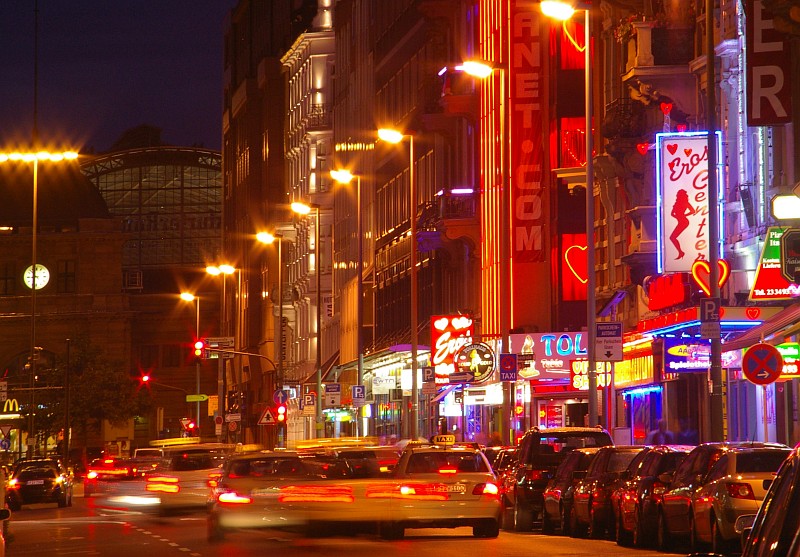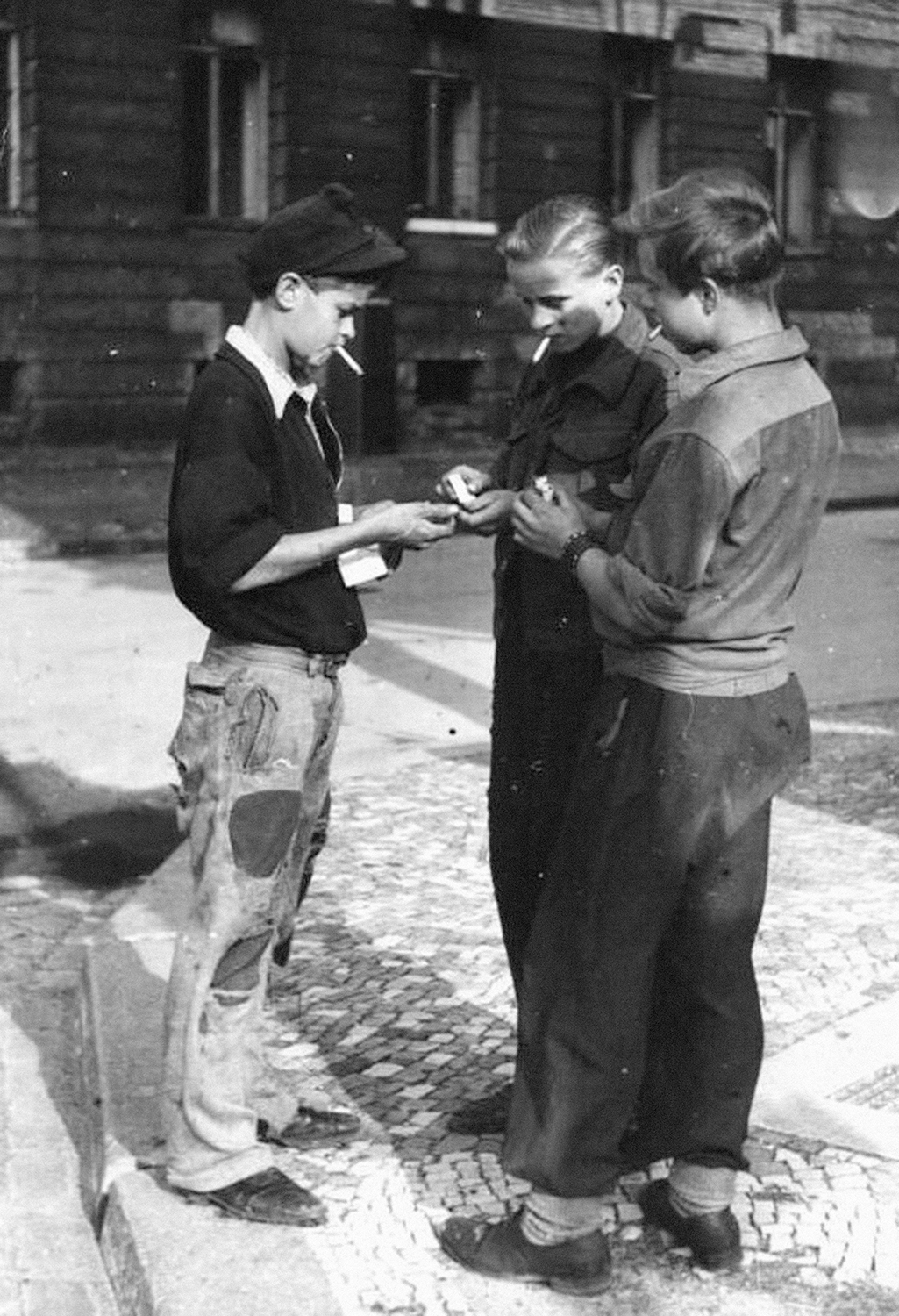|
|
|
|
|
|
Red Lights
|

|
|
Photo: Frankfurt’s Bahnhofsviertel, 2006. From Flickr.
|
|
|
Anyone who has been to Frankfurt might know the reputation of the Bahnhofsviertel, the area that surrounds the train station, home to the red light district. But much more obscure is the history of the Jewish Holocaust survivors who helped shape it. In his piece, "From Auschwitz to Skyscrapers, Guli Dolev-Hashiloni, a novelist and historian, describes the controversial history of the ganefs (Yiddish for crooks or petty thieves), as well as the challenges discussions of them pose in a still antisemitic Germany.
|
Also on our website, Yael Attia, Emily Dische-Becker, Daniel Loick, Anthony Obst, and Vanessa E. Thompson offer an analysis of "non-carceral anti-antisemitism," drawing on feminist theory and carceral studies to critique Germany's approach to countering perceived antisemitism. Alexander Schnickmann returns with a second dispatch from Berlin, in which he offers some reflections on finding silence in the city. And in this newsletter, we are launching our new column, Seifenblasen ("soap bubbles"), a regular series in which writers and editors will share extremely brief reviews of films, books, cultural exhibits, or experiences. For the first installment, Contributing Editor Ron Mieczkowski reflects on The Brutalist.
|
If you enjoy the Diasporist, please consider donating to our project. Your money helps our publication grow and bring new stories in both German and English.
|
|
Editor-in-Chief, the Diasporist
|
|
|
|
|
|
Guli Dolev-Hashiloni
|
|

|
|
"Jewish crime was tolerated by the Germans, who turned a blind eye to people with numbers on their arms. The Americans also favored the ex-victims over the ex-perpetrators, and were the main patrons of the Jewish bars. But not only Americans visited the more than 50 Jewish-owned peep-show clubs in Frankfurt and its surroundings. According to my interviewees, they were also frequented by Frankfurt School philosopher Theodor W. Adorno. In their reporting, Israeli journalists noted how shameful it was that most of Frankfurt’s seediest Lokals — as the clubs were called — were owned by Jews. But according to the Zionist narrative of the time, the biggest disgrace of these camp survivors was not their criminal lifestyle, but rather their decision to continue living in Germany at all."
|
|
|
|
|
|
Why repressive measures fail to combat antisemitism – and what strategies work better
|
|

|
|
"Carceral perspectives often involve de-articulating the antisemitism of mainstream society. If the main means available for combating a problem is criminalization, then antisemitism is constructed as external to the norms of a society. It is thereby detached from broader societal structures, suggesting that it can be overcome through isolation or exclusion. This effectively exonerates the (Christian, white) majority society, which makes itself the arbiter of an antisemitism that is frequently externalized through rhetorical constructions such as those around the idea of 'imported antisemitism.' As a result, while Palestinian demonstrators often face repercussions for accusations of antisemitism, the antisemitism of, say, Elon Musk or the antisemitic pamphlets alleged to have originated with Bavaria’s deputy prime minister Hubert Aiwanger remain without consequences."
|
|
|
|
|
|
|
|
Alexander Schnickmann
|
|

|
|
"I’m suddenly beginning to find all this a little old. Is it a “boomer take” to say that Berlin isn’t quiet enough? Am I the furious pensioner in the quiet compartment? Am I the asshole because sometimes I just don’t want to be able to hear anyone? Perhaps — but that doesn’t bother me for now. It’s true that quiet doesn’t always have the best reputation. There is this authoritarian loneliness. The desire for quiet becomes an argument against children, against joy, against everything other than work."
|
|
|
|
|
|
|
|
Leave Early
Ron Mieczkowski on The Brutalist (directed by Brady Corbet)
|
|
|
|
An invitation: See this movie, absolutely. Go to your favorite cinema and marvel at what comes from the screen. Observe how Adrian Brody suffers and loves, how his László Toth breaks with American society (and himself) — everything about his acting is wonderful. Blink briefly if you find the (interior) architectural designs too artificially intelligent. But don’t worry, that will not diminish your enjoyment of the movie.
|
But as soon as the frame announcing the intermission of the three-and-a-half-hour movie appears, if you are there to see a good movie — leave. Go to the movie bar, buy a drink for the way home, and don't return to the theater. You will leave remembering a movie that is a monument to migrants and refugees, in the 20th century and beyond.
|
But if you are one of the unfortunate members of those professions who criticize, edit or proofread, or who lead a dramaturgy seminar — go back. In the second half you will find a textbook example of how a director can let his own movie go needlessly wrong. You will be able to point this example out to your writers (or students) for a long time to come.
|
There is a scene in the second half that is not only metaphorically overloaded (yes, it's the assault). As a metaphor, this scene could be benevolently overlooked. However, because the final minutes of the narrative return to it and develop it into a dramatic element, the film, what seemed to be a multi-layered story of emigration, poverty, dependency, and death, instead becomes the family tragedy of the secondary characters. We see the end of a certainly good, but completely different movie. Perhaps the film rolls were swapped during the intermission?
|
|
Happy are the hasty ones, happy are those who have had their fill of the magic of the camera after just under two hours, who have an appointment to get to or have to get up in the morning — we should follow their example more often. Sometimes, it’s worth it to leave when it's at its best.
|
|
|
|
|
|
|
Ready to support our mission?
Donate to support our work.
|
|
|
|
|
|
Interested in learning more?
Follow us on social media to stay on top
of what we’re planning.
|
|
|
|
|
|
|
|
|
|
|
|